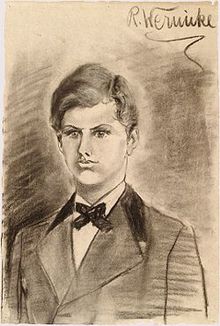Wilhelm Reinhard Berger
(9 August 1861 - 16 January 1911) was a German composer, pianist and conductor
[작품 모음]
Life
Berger's father, originally a merchant from Bremen, worked in Boston (where Berger was born) as a music shopkeeper and made a name for himself as an author after the family had returned to Bremen in 1862. Early on, his son showed signs of musical interest and aptitude. By the time of his first concert, age fourteen, Wilhelm had already composed a large number of songs and works for the piano. Between 1878 and 1884, Berger studied at the Royal Conservatory in Berlin, under Ernst Rudorff (piano) and Friedrich Kiel (counterpoint). From 1888 to 1903, he was a teacher at the Klindworth-Scharwenka Conservatory, a function which he combined, from 1899, with the chief conductorship of the Berlin Musical Society. In addition, he was very active as a concert pianist. In 1903, Berger was made a member of the German Royal Academy of Arts, and in the same year he was appointed 'Hofkapellmeister' in Meiningen as successor of Fritz Steinbach. In 1911 he died at Jena, aged 49, due to complications after a stomach operation.
Musical style
Like most of the composers from the circle of the 'Berlin Academics', Berger developed a great mastery of music theory. Stylistically, his music is very close to that of Johannes Brahms, even though it almost hints at the later works of Max Reger (who was to become Berger's successor as Meiningen Kapellmeister) through its preference for dissonant harmony and counterpoint techniques.
Berger was a prolific composer - his oeuvre numbers well over a hundred works. The Piano Quintet, Op. 95, the Second Symphony and the late compositions for choir are generally considered to be his masterpieces. Long after his death, his work was rated very highly, particularly among musical conservatives. Wilhelm Altmann wrote very positively about Berger in the third volume of his influential Manual for String Quartet Players (Handbuch für Streichquartettspieler).
Piano Quintet in F minor, Op. 95
00:00 - I. Allegro non troppo ed energico
17:20 - II. Poco adagio
28:40 - III. Molto vivace
37:17 - IV. Allegro moderato e con brio
This Piano Quintet dates from 1904 and was composed shortly after his Trio for Clarinet, Cello and Piano. As with the Trio, it is tonally is more advanced than Brahms but not quite so advanced as Reger. The editor of The Chamber Music Journal described the Quintet as follows:
- "Masterpiece is not a word to be to bandied about lightly, but of its genre, this work qualifies. The opening Allegro non troppo ed energico is massive and breathtakingly broad in conception, lasting nearly 20 minutes but its leisurely captivating themes hold the listener throughout. The Poco Adagio which follows is also a big movement. The part writing is very fine and his total mastery of compositional technique is apparent. The third movement, Molto Vivace, is an excellent scherzo which goes well beyond the limits of Brahms. The concluding Allegro moderato e con brio again is also a big movement. Here is a chamber work conceived on the scale much like a Mahler symphony."
The piano quintet is dedicated: "Dem böhmischen Streichquartett in Verehrung zugeeignet".
'♣ 음악 감상실 ♣ > [1860년 ~1880년]' 카테고리의 다른 글
| [프랑스]Paul Dukas (0) | 2017.06.15 |
|---|---|
| [미국]Edward MacDowell (0) | 2017.05.30 |
| [스페인]Isaac Albeniz[이사크 알베니스] (0) | 2016.07.17 |
| [스웨덴 여성 음악가]Laura Valborg Aulin (0) | 2015.12.01 |
| [스웨덴]Wilhelm Peterson-Berger (0) | 2015.03.20 |
